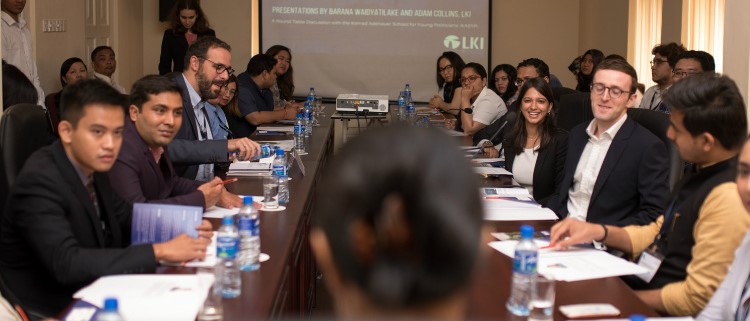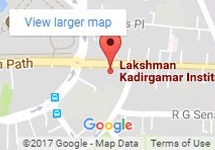
Reading Time: 2 min read
LKI hosted a 24-member delegation from the Konrad Adenauer School for Young Politicians (KASYP) for a discussion on “Sri Lanka’s Foreign Policy in the Region,” on 1 February 2018. The delegation was headed by Mr. Christian Echle, Director of the Konrad Adenauer-Stiftung Regional Programme Political Dialogue Asia, and comprised young politicians from India, Singapore, Bangladesh, Malaysia, Myanmar, Indonesia, Mongolia, Nepal and the Philippines, along with other representatives from KAS.
The KASYP programme was conceptualised and first implemented in 2010. The programme is designed to strengthen political parties in Asia, and to develop a cadre of accountable and responsible young political leaders.
The round table at LKI, held in partnership with KAS, was addressed by Dinusha Panditaratne, Executive Director of LKI, and by Barana Waidyatilake and Adam Collins, both Research Fellows at LKI. The discussion was moderated by Anishka De Zylva, Research Associate at LKI.
Dr. Panditaratne delivered the introductory remarks, which provided an overview of Sri Lanka’s foreign policy in the region and frameworks for Sri Lanka to achieve its strategic and economic goals. Mr. Waidyatilake’s presentation covered the governance and security aspects of Sri Lanka’s foreign policy. He highlighted that Sri Lanka’s foreign policy is geared towards multilateral engagement and noted Sri Lanka’s options for pursuing a regional rules-based order include (ii) using existing regional platforms, e.g. the Indian Ocean Rim Association, or the Indian Ocean Naval Symposium, (ii) strengthening existing regional normative statements like the Jakarta Concord, and (iii) as previously discussed by Dr. Panditaratne, monitoring the evolution of the emerging Quadrilateral Security Dialogue and potentially considering observer-level engagement with that group.
Mr. Collins’s presentation covered the economic aspects of Sri Lanka’s foreign policy. He highlighted that Sri Lanka’s economy is not well integrated with other economies in South Asia or those of the wider Indian Ocean region. He, therefore, emphasised that Sri Lanka’s current economic strategy was an attempt to address this shortcoming by boosting trade and investment, primarily through FTAs. He also noted that, while there are risks to this strategy—most notably growing protectionist sentiment globally—Sri Lanka is well placed to take advantage of strong growth in India and Southeast Asia.
Download Barana Waidyatilake’s presentation on “Sri Lanka’s Quest for Security in the Indian Ocean Region” here.
Download Adam Collins’ presentation on “Sri Lanka’s Economic Agenda in the Region” here.



